Kidney stones are surprisingly common, affecting at least 10% of people in the United States. Of course, passing kidney stones is incredibly painful and people are desperate for ways to get rid of kidney stones quickly! There are numerous foods and supplements that claim to dissolve kidney stones. Or, help you pass kidney stones quickly and with less pain. Let’s review some of the common foods and supplements that claim to do this, including olive oil & kidney stones.
Table of Contents
Olive Oil & Kidney Stones
A common claim is that consuming large amounts of olive oil will help pass kidney stones with less pain and more quickly. Websites suggest that olive oil will help lubricate the stone and help it pass through the ureter more smoothly. Because food must be broken down into it’s chemical components, absorbed through the intestine, re-packaged and metabolized by the liver, this lubrication of kidney stones does not make physiologic sense. There is no research to suggest that olive oil “lubricates” kidney stones to help them pass.
Olive Oil Kidney Stone Research
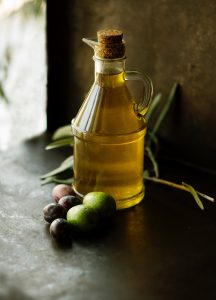
One small study has been published showing that male mice who consumed 1.7mL olive oil per kilogram body weight (per day) did have a fewer calcium oxalate kidney stones after 28 days.(1) The lower incidence of kidney stones was likely due to improved urine chemistries after 28 days on this regimen. However, no studies have been done in humans to confirm that human bodies react the same way.
Many animal studies do not translate to the same outcome in humans and it can be dangerous to give nutrition recommendations based on a single animal study. In addition, a 150 pound (68 kilogram) human would have to drink about a 1/4 cup of olive oil each day to meet the amount of olive oil supplemented in this trial. This is a significant amount of oil that, over time, could contribute excess calories and displace healthy foods that we know reduce the risk of kidney stones.
Olive Oil Kidney Stone Verdict
Bottom line: I cannot recommend taking olive oil reduce the risk of kidney stones. There is not enough research to make about olive oil and kidney stones this time.
Should I Eat Olive Oil?
Absolutely! Olive oil is a heart healthy fat, and is recommended by the American Heart Association along with many other oils including canola, sunflower, corn and peanut oil.(2) I absolutely recommend using olive oil as a fat source in cooking over saturated fats, such as butter. I just cannot recommend drinking olive oil, or using very large amounts, as a means to reduce risk of kidney stones.
What About Fish Oil?
Similar to olive oil & kidney stones, there are claims that fish oil helps pass kidney stones. There is no research to support this claim. In fact, an article published in the journal of the American Urological Association concluded there is no benefit to fish oil in kidney stone prevention.(3)
Eating fatty fish such as salmon, tuna or mackerel is a healthy practice and may reduce the risk of heart disease. The American Heart Association recommends eating fatty fish twice per week to gain heart health benefits.(4) However, there is no research to support taking fish oil for kidney stone prevention purposes.
Other “Natural” Kidney Stone Remedies
Apple Cider Vinegar
Apple cider vinegar is commonly listed as a home remedy to treat kidney stones. I could not find any published research, in animals or humans, to support the claim that apple cider vinegar dissolves kidney stones. It is not recommended.
Cranberry Juice
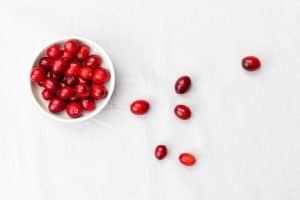
Cranberry juice is commonly listed as beneficial for kidney stones. One small study in 20 men study found that drinking 500mL of cranberry juice per day reduced urine oxalate (despite high levels of oxalate in cranberry juice itself!), urine calcium and increased urine citrate.(5) However, another study found that cranberry supplements increased urine oxalate, as well as some other kidney stone risk factors.(6)
Larger studies have found an increased risk of kidney stones with juice, especially apple juice and grapefruit juice. (7–8) This makes sense as juice (even 100% fruit juice) contains a fair amount of sugar. We know that added sugar increases urine calcium, and subsequent risk of calcium kidney stones.(9)
Bottom line: There is inconclusive research on the potential benefit of cranberry and kidney stones. I cannot recommend it at this time. And, I am concerned about the sugar drinking cranberry juice would add to the diet.
Chanca Piedra
Chanca Piedra (Phyllanthus niruri) is a tropical plant that grows on costal areas. Alternative medicine recommends its use as a supplement, teas or essential oil to help treat a variety of health conditions. Claims include treatment of ulcers, urinary tract infection, swelling and to lower blood sugar. Although research is lacking for most of these claims, there is some interesting research behind the use of chanca piedra for kidney stones.
The majority of studies evaluating the impact of chanca piedra on kidney stones has been in cells or rats.(10,11,12,13) Many of these studies did show promising results.
A few human trials have been done. Fifty-six patients with kidney stones drank a tea made from 4.5g of chanca piedra, twice per day, for 12 weeks. When people were consuming the tea, urine oxalate and uric acid were lower in people who had high levels at baseline. Also, images showed fewer kidney stones after drinking the tea (3.2 compared to 2.0 kidney stones). Of note, 66% of patients experienced abdominal pain during the trial. (14)
Another study found that a 450mg supplement of chanca piedra reduced urine calcium in people with kidney stones.(15) This is important because urine calcium is the primary determinant of calcium kidney stone formation.
Although there has been some promising research in treatment of kidney stones with chanca piedra, we need more research before conclusive recommendations can be made. For example, we don’t fully know what dose (or what form) is best for reducing kidney stones. We need to know if there are unforeseen risks to taking this herb. And, is chanca piedra helpful for everyone with kidney stones? Or, is it helpful for a sub-set of people with a specific stone type?
Before I can feel comfortable recommending chanca piedra for kidney stones, I need answers to these questions.
Lemon Juice
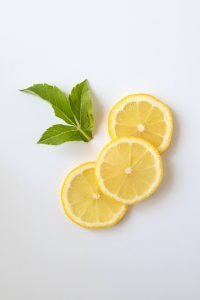
Lemon juice is commonly recommended to people with kidney stones. This is primarily because lemon juice (and other citrus juices), has a fair amount of citrate. Citrate in the urine can help prevent kidney stones.
For some people with kidney stones, increasing urine citrate is an important piece of treatment. And, consuming large amounts of lemon juice (around 3 oz) per day can increase citrate in the urine.(16) However, increasing urine citrate is only useful for people with low levels of urine citrate. One study found that urine citrate was low in about half of kidney stone formers.(17)
There are multiple ways to increase urine citrate. Lemon juice, Crystal Light lemonade (which contains more citrate than lemon juice), potassium citrate pills, or, even just eating more fruits and vegetables will increase urine citrate! Make sure to talk to your doctor or dietitian to determine 1) if you have low levels of urine citrate and 2) what is the best way for you to increase urine citrate.
If your doctor recommends increasing how much lemon juice you drink, be mindful of sugar! Lemonade has a very large amount of sugar added to it. Too much added sugar increases your risk of kidney stones. Instead of lemonade, I recommend adding lemon juice to water without sugar (or, with a little artificial sweetener), or add it to your food for a great burst of flavor! Lemon juice is a great way to add flavor to your food and help you cut back on salt! Eating too much salt also increases your risk of kidney stones.(9)
Other Kidney Stone Remedies
A Google search will reveal many other supplements and foods that claim to be helpful for kidney stones. Some examples are:
- Pomegranate
- Basil
- Beetroot
- Celery Juice
- Kidney beans (and, kidney bean water)
- Green tea
- Ginger
- Milk thistle
None of these have been proven to reduce the risk of kidney stones. They are not recommended.
In addition, many of these foods contain very high oxalate. Notably, beets are incredibly high in oxalate. Although I do not recommend that everyone with kidney stones limit how much oxalate they eat, consuming foods in concentrated supplemental form can be problematic. Similarly, juicing foods can have the same effect. The amount of oxalate that you could easily eat in either supplement or juice form is much higher than if you simply ate the food.
Dangers of Supplements & Kidney Stones
It is important to remember that nutrition and herbal supplements are not necessarily benign. Just because something is “natural”, does not mean it cannot cause harm. A great example is grapefruit. Grapefruit contains a chemical that interacts with the cytochrome P450 enzyme that is responsible for metabolizing many common medications, including statins and some anti-rejection medications given to transplant patients. Of course, for most people grapefruit is a perfectly healthy fruit! But, for some, this “natural” food can render medications either ineffective or cause them to build up to harmful levels.
In the United States, supplements are not regulated by the government or any agency. This means, supplements do not necessarily contain what they claim to have in them. In addition, they often have additional substances in them other than what is listed on the label. Perhaps most importantly, supplement companies can claim a product helps with any health condition under the sun, without any research to support it.
This is a common problem for supplements with kidney stones health claims.(18) A 2020 study found that a majority of supplements that claimed to help kidney stones had no scientific studies behind them.(19) In addition, a review found that no herbs or supplements marketed for kidney stones had reliable scientific backing.(20)
There is a real concern that supplements will not only fail to do what they claim, but could be harmful. This is especially true for people with kidney problems, who may have a reduced ability to get rid of harmful chemicals. Always let your doctor know about any nutrition or herbal supplements you take.
How to Prevent Kidney Stones
So, what should you to do prevent kidney stones. The answer lies in what kind of kidney stones you have. And, your specific 24-hour urine test. There is NO universal treatment for kidney stones that will work for everyone. Your treatment must be tailored to your specific situation. Only your doctor or dietitian can do this for you.
Calcium oxalate kidney stones are the most common kidney stone type. Healthy nutrition plays a huge role for this type of kidney stone. Other than the oxalate component, a diet healthy for calcium oxalate kidney stones is what is recommended for general health. Following these diet recommendations will reduce your risk for nearly every chronic disease. Drinking enough water, getting adequate calcium and avoiding too much animal protein, sugar and salt is a wonderful place to start.
Happy Eating!
Melanie

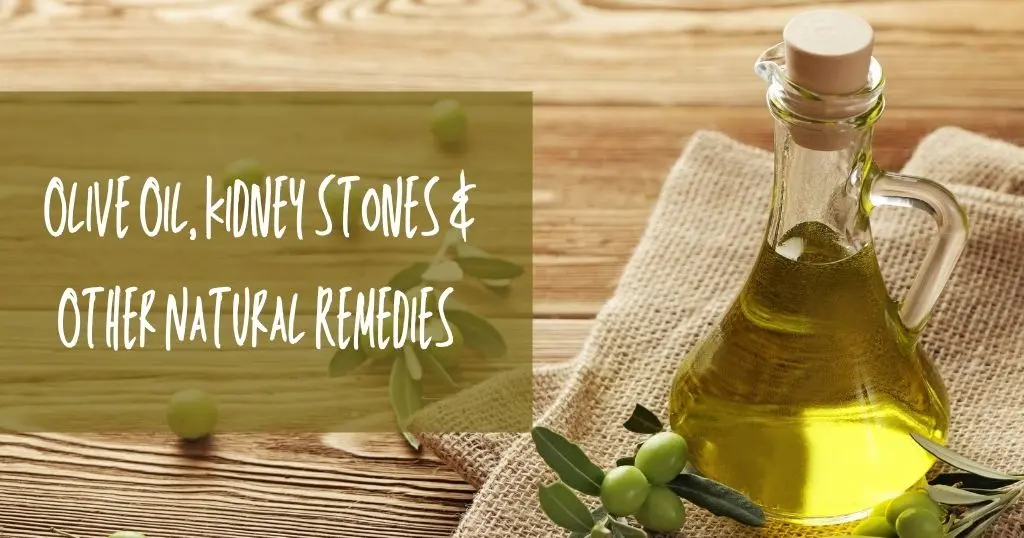
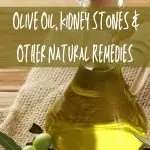
Hi Melanie, reading your information about kidney stones and the comments, it is very interesting. So far, your guided suggestions of foods, to help prevent kidney stones has absolutely helped me.
Thank you,
Melanie, I wish to amend my previous comment. I certainly don’t believe cranberry juice or cranberries move kidney stones. I don’t believe that at all. I want science-based recommendations. As someone who can’t take Flomax or any related medications because it triggers low blood pressure, I do find that cranberry juice “opens things up” and I don’t retain urine, as verified by my urologist. Oxalate is my only risk factor. I look forward to hearing from you about a source that cranberry juice is high oxalate. I’ve been stone-free for five years, following a reasonable stone prevention diet, drinking enough water, eliminating the massive doses of a turmeric supplement for pain from a misdiagnosed hip for a decade (I’m limited with pain meds since I’m allergic to NSAIDS) plus my “healthy” previous diet of beans, spinach, beets, almonds, etc. I look forward to hearing from you, Melanie.
Can you provide a source that cranberry juice (and/or) cranberries in general are high in oxalate? I’m very careful about the few reliable sources I follow, and everything I see says cranberries and cranberry juice are low. Looking forward to any sources you can provide. Always willing to learn something new
Cranberries are generally low in oxalate. I cited a study that found cranberry juice increased URINE oxalate – which is very different than the food being high in oxalate itself. Urine oxalate is determined by MANY different factors – one of the MANY reasons I don’t advocate for a strict low oxalate diet. Kidney stone prevention is MUCH more than that.
I have a small kidney stone and suffer from gout and I read magnesium is good for both. Apparently magnesium can help prevent kidney stones by binding to oxalates. When magnesium binds to oxalate, it forms a compound that is less likely to form kidney stones. What are your thoughts?
I have an entire article about magnesium and stones. You can check it out here!
I have been battling with a kidney stone for more than two years, the pains are horrible. please what should I do to stop it?
I’m so sorry to hear that! My specialty is nutrition and stone prevention. There isn’t much, unfortunately, that nutrition can do to help pass existing stones. Your urologist who is most familiar with your situation is the best person to answer this question!
I tried the olive oil plus lemon juice ‘remedy’, which was terrible and not effective in the least. Most of these do not work and I have tried a lot of them. It seems like you and I have read a lot of the same studies.
Phyllanthus niruri (a/k/a chanca piedra, quebra pedra, stone-breaker) is the exception and has been very effective in my case, so much so that I created a product based on it for kidney stone sufferers like myself, though I no longer sell it and only make it for my family. It was introduced to me in raw form by my Brazilian mother-in-law, a fellow kidney stone sufferer, who swore by the stuff. In my case, brewed as an infusion, it reduced the pain and allowed me to pass stones easier. It was so powerful that I learned everything I could about it.
Melanie, to answer your question, which types of stones is it effective for, I can only say that it works for me and my family on our calcium oxalate stones. My product was a 10:1 extract of P. niruri, ~325 milligrams per dose. Hundreds of customers, no returns (100% refund policy if not satisfied), and many repeat customers. So it may have worked for other types, though I suspect not for cystic and maybe uric acid stones.
It has several effects that are of interest to kidney stone sufferers, researchers, and healthcare providers: analgesic, smooth muscle relaxant/anti-spasmodic (ureter, uterine, etc.), and diuretic. I believe there was an in vivo study on rodents that implanted kidney stones and then administered an extract of P. niruri, which found the stones were reduced in size and their surfaces were smoothed over a period of time. P. nuriri has been studied extensively and has a host of other beneficial uses, but pharmaceutical companies have not been able to isolate a compound or constituent of the plant responsible for its reported effects. If they cannot isolate and commercialize a chemical, it is of no use to them.
Melanie, let me know if you would like to share the e-book I wrote on the home remedy topic. It is not publicly available any longer, but you may be interested. I have a few that are not on this list that maybe you want to add.
Hello! I’m glad you found something that worked for you. I cannot ethically make nutrition recommendations based only on animal studies or anecdotal evidence. Here is an article about how evidenced based nutrition recommendations are made.
I’m very interested in what you have to say Mark. Please reach out to me.
Did you hear from Mark? I’m also interested in what Mark has to say.
I see you show negativity throughout this post
So is there ANY natural additives that do assist in getting rid of kidney stones and slowing down the fornation or easier travel to release them ? Or do you only post what you shouldnt do
Hi Trevor! I don’t mean to be negative, but I cannot recommend these foods for kidney stones because there is no research that they do this. There is NO food for supplement that can help “dissolve” kidney stones. However, nutrition can play a BIG role in prevention. Learn more about that here!
About 10 years ago, I researched and published an e-book on all of the natural and home remedies for kidney stones, which is a more extensive list than this. Believe me, the negativity is just healthy skepticism and is warranted given the limited data and research on some of these methods. There are people who will sell kidney stone remedies, cures, etc., but nearly all of them are profiteers at best, charlatans at worst. There is no quick cure for kidney stones, but diet seems to be the best approach.